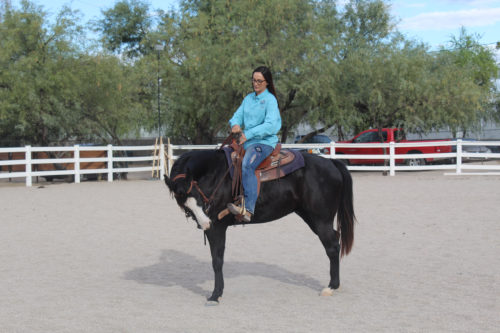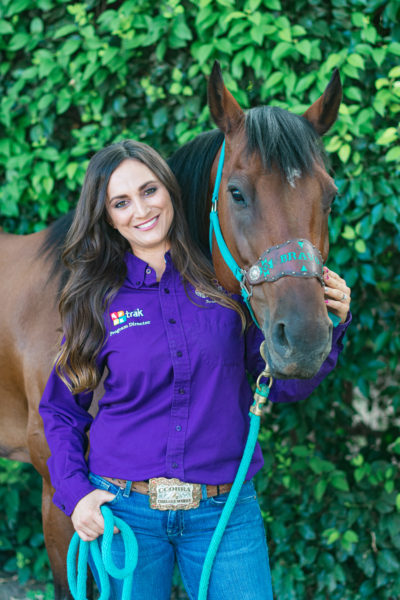
By Taylor Gleeson/Arizona Sonora News
Chelsea Menke has always had a passion for two things: horses and kids. At Therapeutic Ranch for Animals and Kids, or TRAK, she is able to pursue both of her passions as the nonprofit’s program director. With a slim build, dark brown hair that falls around her face, deep brown eyes, cowboy boots and jeans, Menke looks like she belongs on a ranch.
Sitting across a large table set in the kitchen of the office at TRAK, Menke tells the story of how she came to TRAK and what led her to create an equine therapy program at the nonprofit.
Menke’s parents were adamant that she and her siblings join a team sport to keep busy after school, but Menke was not a fan of team sports. Instead, she chose a different path.
“I was watching TV one day, and I saw horses and my dad was always really into the old Westerns,” Menke says, “and I was like, ‘Man, I want to be a cowboy.’” Menke’s mom signed her up for horseback riding lessons that weekend, when she was 5 years old.
Menke’s first horse, Frenchie, came into Menke’s life at an early age. “I got my first horse when I was 8 years old. He was kind of the family horse, but he was really my horse. And he was a Mustang off a ranch down in the South. I credit him for a lot of my success in this field now because he was a difficult horse,” Menke explains.
“He was not easy. And he taught me everything,” Menke says. She and the horse had to develop a strong relationship so that she could teach herself the ways of riding.
Eventually, Menke’s family moved to Tucson and she found herself at the University of Arizona, where she studied psychology. But she always knew that she wanted to incorporate horses into her everyday job.
“Even though I was kind of studying to be a therapist, I always wanted to be able to integrate horses. At that time equine therapy, even now, is still growing,” says Menke. “Using the horse as a therapeutic modality is becoming really popular. So I just knew in the back of my mind, I always wanted to keep my foot in the door with horses.”
Equine therapy has been studied more recently, and studies have shown that this type of therapy can help individuals with both mental and physical disabilities.
According to a dissertation by Erin J. Grimm, a former PhD student at Duquesne University, participants in her equine therapy study showed increased skills all around, from physical to emotional. “Participants within this study revealed the enhanced development of social and emotional skills necessary for success in the community,” wrote Grimm. With research like this, Menke’s idea of combining her degree in psychology with her passion for horses did not seem so far-fetched.
But she did not get to combine her two loves immediately after college. After graduating from college, Menke worked for a behavioral health facility in Tucson as a counselor, never losing sight of her goal to work in the equine branch of therapy. “My husband found TRAK, and came down and spoke with the executive director, Scott Tilley,” Menke says. Although she did not get the job straight away, Menke remained optimistic about working with the TRAK program.

“What ended up happening is I really came in as just kind of a substitute to teach kids horseback riding lessons while he (Tilley) was out of town and just kind of relieve him,” she explains. “And then probably a year after that, maybe a little more, they decided to bring me on as their first-full time position as program director. And my goal was to really grow the programs they already had and then grow the therapeutic programs, because they really weren’t doing much of anything as far as conducting therapy or skill building or anything.”
TRAK sits in the middle of Tucson, off East River Road and North Alvernon Way, but feels a million miles away from the city. On the edge of the Catalina Foothills with the prominent smell of horses, dust and nature, TRAK is a place where people go to experience the healing powers that animals possess. Walking around the ranch, Menke beams as she introduces people to all the animals, including horses, pigs, bunnies, chickens, dogs and more. Menke even has her own horse at TRAK, where he is part of the various programs they offer.
Using her skills from working as a psychologist, Menke took on her role as program director with big ideas in mind. “What I started doing was putting together, AALS is what we call it, animal assisted life skills. And we worked really hard to figure out what we can do without having a therapist, like a licensed therapist and what we can do to focus on skill building with certain kids,” Menke says. “So that was working and was really successful for us, as well as growing the other programs. You know, we have probably double the amount of horseback riding students than we did when I started.”
On a usual morning, Menke gets to TRAK at 6 and starts her day with some administrative work. “Back in the day when we weren’t quite as busy and successful … I did everything,” she says. “I taught lessons, I worked shift, I did administrative work, I was all encompassing. So I’m kind of able to do almost every job description that we have here at the ranch.”
Menke’s eyes light up as she starts to tell one of her favorite stories from her time working with TRAK. “There was this old gentleman named Bob and we did a service visit (with him),” she remembers. A service visit involves the TRAK team taking some of the animals like bunnies and goats to schools or elderly care facilities around the community.
At first impression, Bob wasn’t a very friendly man. “Bob never would talk to the staff at the elderly care facility. He was not very engaging. But if he knew that TRAK was coming,” Menke says, “he’d get up in his walker and he’d scoot all the way downstairs, ready to engage with the kids and the animals.” Menke glows with pride as she talks about Bob and the way the animals could create such a positive experience for someone who does not normally seem to be enjoying life.
A couple years ago, Menke reached out to Intermountain Centers for Human Development, an organization that provides services for at-risk populations in Arizona. Intermountain has community, foster care and residential services that benefit local communities and has been around since 1973. With the help of Intermountain, Menke created programs at TRAK to help children with disabilities.
Stephanie Hackett, clinical supervisor at Intermountain Centers, and a lover of horses herself, showed a clear admiration for Menke one evening after a group session. “I’ve known Menke for about a year-and-a-half at this point,” Hackett says. “It’s great to be part of such a caring and dedicated team. The passion and energy that the TRAK and Intermountain staff bring to the group is incredible.”
Hackett participated in a group event walking Bravo the horse to demonstrate to the kids how a horse can sense a person’s emotions. “Watching the kids go through all of the group sessions had been a privilege,” Hackett says about the groups of kids she gets to work with. “Many of them walk in on the first day and are quite anxious about being around and interacting with the horses. But over the course of the six weeks, you really get to see them bloom and grow into themselves.”
Menke not only is the program director, but she also keeps one day a week in her schedule available so that she can give riding lessons and teach groups. On a recent Wednesday night, Menke led a class in which kids with disabilities got the chance to work with the animals at the ranch. As the sun was setting over the ranch, casting a pink glow over the group, the kids practiced leading Bravo in circles, watching their body language and working on both verbal and nonverbal communication.
One student who suffered from high anxiety got Bravo to gallop instead of just cantering, which according to Menke, was because the horse could sense the girl’s emotions. As she walked the animal, timidly at first, her unease was evident. But slowly, as she saw the horse reacting to her body language and anxiety, she was able to calm her emotions and the horse slowed to a walk. Menke watched from the side of the corral, with an evident look of pride in her eyes.
Menke feels incredibly lucky to have her job; to be working with her horses for a living. For her, going to work isn’t just work, it’s what she loves to do. “I know how awesome this is, and I know how lucky I am. I really have a very unique and very cool position, and I’m very grateful for that,” Menke says.
